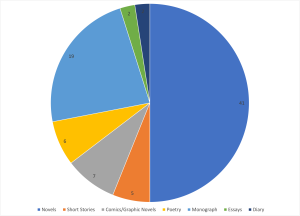I have a mixed bag this time around. I’ll start with this video, which isn’t really a video but a sound file with an image attached so that somebody could put it on YouTube. Because of a film I watched recently, I’ve been listening to Chinese music played on theguqin, a seven-stringed zither played seated; it’s sort of a mix between a Japanese koto and a pedal steel guitar. This is a performance by Guan Pinghu, a master of the classical tradition.
Article: “Scent from Heaven” by Al Jazeera (no author listed)
Oud, or agar wood, is a resinous wood that, when burned, produces a distinctive scent; it can also be used as an ingredient in perfumes. It’s produced by several species of trees from Southeast Asia, all in the genus Aquilaria. But the wood of one of these trees isn’t necessarily oud; according this article, the trees produce the resin that is the source of the scent in response to injury— specifically, fungal infection. So, only a small fraction of trees actually have oud in them, and not throughout the entire tree; moreover, the resin builds up over decades or even centuries, so to get the best quality stuff, you need very old trees, which are rare almost by definition. Demand for the wood, particularly in parts of the Middle East, has increased dramatically even as supplies become scarcer— with the result that the wood has become more valuable than gold. Sixteen kilograms of the rarest variety, known as kynam, recently sold for twenty million dollars. Predictably, with that kind of money at stake, it’s being harvested unsustainably. You can’t tell if a tree contains agarwood, or how much, without cutting it down, so people simply raze whole forests to see what they can find. Several countries have banned the harvesting of wild trees, and plantations have been developed to provide a substitute, but since plantation trees are rarely allowed to age as long as many think is necessary to produce the best quality oud, illegal logging remains common and the laws against it are about as well enforced as conservation laws in poor parts of the world usually are.
I’ve started to feel like almost everything I post here could be introduced with “here’s something I was totally unaware of,” and so I’ve become self-conscious about actually saying that. All the same, I didn’t know anything about oud, and yet this is a trade that is worth millions of dollars and threatens the extinction of multiple species.
Article: “Welcome to the Land that No Country Wants” by Jack Shenker
Bir Tawal is a tiny strip of the Nubian Desert on the border between Egypt and Sudan but claimed by neither— claimed, in fact, by nobody. The reasons are a little complicated, but basically there are a couple of conflicting colonial-era edicts that suggest that whichever of the two powers claims Bir Tawal will thereby give up any claim to a larger area to the north, the Hala’ib Triangle, which both do want; so Sudan’s maps show Bir Tawal as part of Egypt and the Hala’ib Triangle as part of Sudan, and Egypt’s maps show the reverse. There are plenty of bits of land (and in fact ocean) whose ownership is disputed by two or more countries, with sovereignty thus undetermined, but this might be the only place on earth that no country seems to want.
Well, not exactly nobody. In June 2014, and American from Virginia named Jeremiah Heaton traveled to Bir Tawal and claimed it for himself, declaring himself its ruler and his daughter a “real princess.” He was apparently spurred by a birthday wish of hers, but now that he’s made the claim he’s trying to turn Bir Tawal into a kind of libertarian utopia, where corporations can act without government regulations. So far, no country or power on earth recognizes his claim.
A few years before Heaton, though, Shenker and a friend named Omar also traveled to Bir Tawal and laid claim to it, imagining (not entirely seriously) that they were founding a new republic which would uphold ideals like democracy and human rights. Here, Shenker examines the history of Bir Tawal, and (more interestingly) the way that (apparently) unclaimed spaces provide a screen upon which to project any number of fantasies of freedom, escape, adventure, or power.
Article: “Sail (Far) Away: At Sea with America’s Largest Floating Gathering of Conspiracy Theorists” by Anna Merlan
What do you get when you put a whole bunch of self-described conspiracy theorists on a yacht together in the middle of the ocean? Well, kind of what you’d expect, I guess. Some of these are old theories (vaccines cause autism, the CIA started the crack cocaine epidemic), but a bunch were a surprise to me. Did you know, for instance, that the British royal family both control the American Bar Association and are actually giant lizard creatures merely posing as human beings? That by filing the appropriate paperwork, you can exempt yourself from federal authority entirely? That there a black holes in distant space that are undermining our financial system? That death itself is all some kind of scam, and nobody has ever actually died at all? My initial reaction to this article was incredulous amusement: “Oh my god, people actually believe this stuff?” As I read further, though, it shifted to something more like “Oh my god; people actually believe this stuff.” You start out thinking it’s funny, and end up thinking it’s sad.
The thing that strikes me about conspiracy theorists is that although they are intensely skeptical of the “mainstream” or “official” story about how things work, that doesn’t translate into a general skepticism or critical attitude; instead, they discount entirely one kind of source or story, but accept entirely another kind. This allows them to be deeply naive and easily swayed while feeling worldly and critical. This is how somebody can find the idea that 9/11 was attack by foreign terrorists to be irredeemably fishy, despite all the evidence, and at the same time find this website totally credible. Merlan suggests that Americans are especially prone to conspiracy theories, because they appeal to a widespread suspicion of authority and, at the same time, suggest that individuals can subvert these powerful forces through their own wit and effort. I don’t know if that’s right or not, but it does seem to me that the sheer number and range of these theories on this cruise do suggest that a great many people are looking for something they aren’t finding.
Unintentional Conversation: “Is the Album Review Dead?” by Dan Ozzi, and “Everybody’s a Critic. And That’s How It Should Be.” by A.O. Scott
Dan Ozzi’s piece begins with a contrast between two eras. In the first, album reviews were a primary way (in competition only, really, with the radio) that listeners found out about new music and got guidance about whether to spend their money on it. Reviews— and reviewers— were therefore pretty powerful. In the second, current era, the music itself is far more easily accessible; you don’t have to go into a physical store with bins full of opportunity costs in jewel cases and make a choice based on, at best, one radio single and a positive review, crossing your fingers all the way home that you didn’t just buy that one song you like along with a whole bunch of filler. In this era, reviews are almost inherently less important, because listeners no longer need them in the way we once did; we can judge for ourselves, with little expense or even the need to get up from our chairs.
That kind of reduces the role of the critic (and not the switch there from “review” to “critic”) to its service-journalism aspect— their role as the ones who tell you whether or not to spend time and money on something. That’s one role of the critic, but not the only one, and not the most important. A.O. Scott, in an essay drawn from his new book Better Living through Criticism, focuses on the idea of criticism as a creative act, one by which we not only respond to things but come, ideally, to understand why we respond the way we do. He doesn’t, here, really mount much of a defense of professional critics, though I understand that’s a major theme of the book. His argument reminded me, though, of this piece by Daniel Mendelson, in which he describes the role of the critic as being “to recreate on the page the drama of how they had arrived at their judgments,” and through that performance help readers to reach judgments of their own. If all you get from a piece of critical writing is knowledge about what the critic him/herself thinks, then it’s probably not good criticism. Mendelson, describing the great critics writing for The New Yorker in the 1970s, says “Even when you disagreed with them, their judgments had authority, because they were grounded in something more concrete, more available to other people, than ‘feelings’ or ‘impressions.'” Good critics illustrate and exemplify a process for developing ones understanding. Susan Sontag somewhere described the role of the critic as directing attention to something— not simply recommending it (maybe sometimes emphasizing what is wrong with it, but placing it under sustained consideration, and making by that effort a case for why such consideration is worthwhile.
From that perspective, the death of album reviews— if such a thing is indeed happening— is potentially a real loss, even if we no longer need somebody to tell us who should get the money we plan to pend on music. Of course, many regular reviews don’t really lead us to self-knowledge and a greater understanding of art or the world in general, and Mendelson is describing, but it seems to me that if one review out of a hundred does so, that’s worthwhile.
Update: In the Times, Daniel Mendelson has reviewed Scott’s book.


